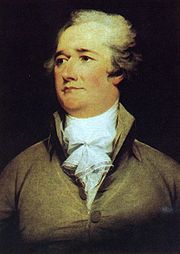
Federalist No. 69
Encyclopedia

Essay
An essay is a piece of writing which is often written from an author's personal point of view. Essays can consist of a number of elements, including: literary criticism, political manifestos, learned arguments, observations of daily life, recollections, and reflections of the author. The definition...
by Alexander Hamilton
Alexander Hamilton
Alexander Hamilton was a Founding Father, soldier, economist, political philosopher, one of America's first constitutional lawyers and the first United States Secretary of the Treasury...
and the sixty-ninth of the Federalist Papers
Federalist Papers
The Federalist Papers are a series of 85 articles or essays promoting the ratification of the United States Constitution. Seventy-seven of the essays were published serially in The Independent Journal and The New York Packet between October 1787 and August 1788...
. It was published on March 14, 1788 under the pseudonym
Pseudonym
A pseudonym is a name that a person assumes for a particular purpose and that differs from his or her original orthonym...
Publius, the name under which all the Federalist Papers were published. The title is, "The Real Character of the Executive", and is the third in a series of 11 essays discussing the powers and limitations of the Executive branch.
Overview
This paper describes some of the legal powers of the President of the United States. To assuage fears that the head of the executive branch will hold excessive power under the ConstitutionConstitution
A constitution is a set of fundamental principles or established precedents according to which a state or other organization is governed. These rules together make up, i.e. constitute, what the entity is...
, Hamilton compares and contrasts the President's powers to those of the King of Great Britain. He explains that while both share similarities, the powers held by the former are undoubtedly inferior to the latter.
Specifically, Hamilton "explained that the president's authority 'would be nominally the same with that of the King of Great Britain, but in substance much inferior to it. It would amount to nothing more than the supreme command and direction of the military and naval forces, as first general and admiral of the confederacy; while that of the British king extends to the declaring of war, and to the raising and regulating of fleets and armies; all which by the constitution under consideration would appertain to the Legislature.'"

